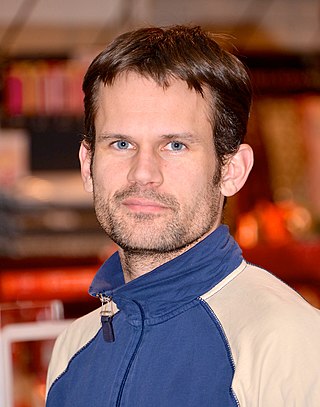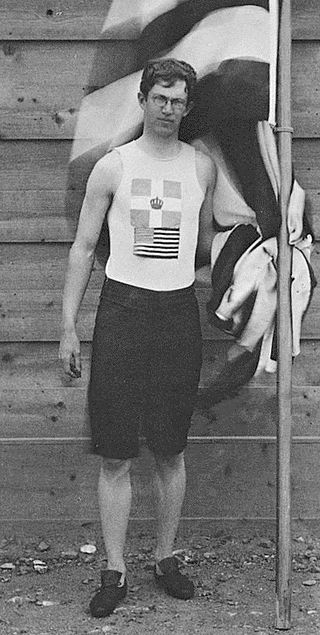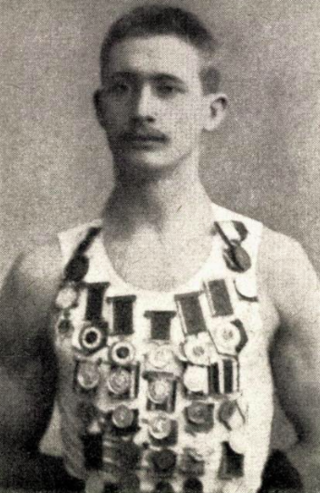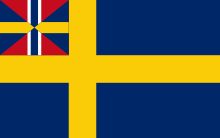
The 1896 Summer Olympics, officially known as the Games of the I Olympiad and commonly known as Athens 1896, was the first international Olympic Games held in modern history. Organised by the International Olympic Committee (IOC), which had been created by French aristocrat Pierre de Coubertin, it was held in Athens, Greece, from 6 to 15 April 1896.

At the 1896 Summer Olympics, eight gymnastics events, all for men, were contested in Panathinaiko Stadium. They were organized and prepared by the Sub-Committee for Wrestling and Gymnastics. Events took place on April 9, April 10, and April 11, 1896. There were 71 competitors from 9 nations that took part in gymnastics.

At the 1896 Summer Olympics, the first modern Olympiad, twelve athletics events were contested. A total of 25 medals were awarded. The medals were later denoted as 37 modern medals. All of the events except the marathon were held in the Panathinaiko Stadium, which was also the finish for the marathon. Events were held on 6 April, 7 April, 9 April, and 10 April 1896. Altogether, 63 athletes, all men, from nine nations competed. This made athletics the most international of the nine sports at the 1896 Games.

At the 1900 Summer Olympics one gymnastics event for men was contested. The competition was held on Sunday, 29 July 1900, and on Monday, 30 July 1900. There were 135 competitors from 8 nations. The top 18 places were taken by French gymnasts, of which there were more than 100. The event was won by Gustave Sandras, with Noël Bas finishing second and Lucien Démanet third. The highest-placing foreign gymnast was Jules Ducret of Switzerland, in a tie for 19th place.

The men's high jump competition at the 2004 Summer Olympics in Athens was held at the Olympic Stadium on 20–22 August. Thirty-eight athletes from 27 nations competed. The event was won by Stefan Holm of Sweden, the nation's first victory in the men's high jump and first medal in the event since Patrik Sjöberg won three in a row from 1984 to 1992. Matt Hemingway took silver, returning the United States to the podium after a one-Games absence. Jaroslav Bába's bronze was the first medal in the event for the Czech Republic.

Kristian Henrik Rudolf Sjöberg was a Swedish athlete, gymnast and medical student. He competed as the only Swedish participant at the 1896 Summer Olympics in Athens.

Three athletes from Denmark competed in five sports at the 1896 Summer Olympics in Athens. Two of the three combined to win a gold medal, two silvers, and three bronzes, while Eugen Schmidt earned no medals. Viggo Jensen contributed one of each color, while Holger Nielsen earned the second silver and two bronzes. Shooting and weightlifting were Denmark's most successful sports. Denmark had 15 entries in 12 events, winning six medals.

France competed at the 1896 Summer Olympics in Athens, Greece, from 6 to 15 April 1896. French athletes had appeared in every Summer Olympic Games of the modern era, alongside Australia, Great Britain, and Greece. France won the fourth-most gold medals with 5 and the fourth-most total medals with 11. Cycling was the sport in which the French competitors had the most success, as they completely dominated the field. The French team had 27 entries in 18 events, winning 11 medals.

Germany competed at the 1896 Summer Olympics in Athens, Greece. The Germans were the third most successful nation in terms of both gold medals and total medals (13). Gymnastics was the sport in which Germany excelled. The German team had 19 athletes. The Germans had 75 entries in 26 events, taking 13 medals.

Ten athletes from the United Kingdom of Great Britain and Ireland competed in seven sports at the 1896 Summer Olympics. The Great Britain athletes were the fifth most successful in terms of overall medals (7) and tied for fifth in gold medals (2). The 7 medals came on 23 entries in 14 events.

Greece was the host nation of the 1896 Summer Olympics held in Athens. The number of Greek contestants is commonly cited as 169, but as many as 176 Greeks contested events in all nine sports. The Greeks were by far the most successful nation in terms of total medals with 47, 27 more than the United States of America. Nevertheless, their number of first-place finishes (10) was one fewer than the Americans' 11. The Greeks had 172 entries in 39 events. Only 4 events had no Greek entrants—the 400 metres and the high jump in athletics and the vault and the team horizontal bar in gymnastics.

One competitor from Italy was present at the 1896 Summer Olympics. He competed in shooting. Italy was one of four nations present that won no medals; Sweden, Chile and Bulgaria were the others. Italy's competitor, Rivabella, entered one event in the shooting program.

The first heat of the men's 100 metres race was the first event run at the modern Olympics, on 6 April 1896. The event consisted of 3 heats and a final, held on 10 April. The 100 metres was the shortest race on the Athletics at the 1896 Summer Olympics programme. 15 athletes from 8 nations competed. The event was won by Thomas Burke of the United States. Fritz Hofmann of Germany took second, with Hungarian Alajos Szokolyi and American Francis Lane tying for third. These competitors are recognized as gold, silver, and bronze medalists by the International Olympic Committee, though that award system had not yet been implemented in 1896.

The men's long jump was one of four jumping events on the Athletics at the 1896 Summer Olympics programme. There were nine contestants in the long jump, held on 7 April. The American jumpers proved themselves dominant in taking the top three spots. The event was won by Ellery Harding Clark. Clark would later win the high jump as well, becoming the only man to win both the high jump and long jump in the Olympics.

The men's triple jump was one of four jumping events on the Athletics at the 1896 Summer Olympics programme. There were 7 competitors from 5 nations in the triple jump, then known as the "hop, skip, and jump" despite the wide range of techniques used by the competitors. The event was held on 6 April, immediately after the first heats of the 100 metre race. Since there was only one round of the triple jump, the winner was crowned as the first modern Olympic champion.

The men's high jump was one of four jumping events on the Athletics at the 1896 Summer Olympics programme. The high jump was held on 10 April. Five competitors took part in the event, three of them Americans. Ellery Clark, who had previously won the long jump, also won this event. Garrett and Connolly tied for second place.

The men's pole vault was one of four jumping events on the Athletics at the 1896 Summer Olympics programme. Five athletes competed in the pole vault. The two Americans far outclassed the three Greeks, starting higher than the Greeks could clear and taking first and second places. Damaskos and Theodoropoulos tied for third, while Xydas took fifth.

The men's discus throw was one of two throwing events on the Athletics at the 1896 Summer Olympics programme. The discus throw was the fourth event held. It was contested on 6 April. 9 athletes competed, including one each from France, Sweden, the United States, and Great Britain as well as three Greeks and two Danes.

Carl Albert "Flisa" Andersen was a Norwegian pole vaulter, high jumper, and gymnast who competed in the 1900 Summer Olympics, 1906 Intercalated Games and the 1908 Summer Olympics.
The men's high jump competition at the 1988 Summer Olympics in Seoul, South Korea had an entry list of 27 competitors from 18 nations, with two qualifying groups before the final (16) took place on Sunday September 25, 1988. The maximum number of athletes per nation had been set at 3 since the 1930 Olympic Congress. There were two bronze medals awarded. The event was won by Hennadiy Avdyeyenko of the Soviet Union, the nation's first victory in the men's high jump since 1972 and fourth overall. Hollis Conway's silver returned the United States to the podium after a two-Games absence that had disrupted the American streak of medaling in every Olympic men's high jump. Patrik Sjöberg's bronze made Sweden the fourth nation to medal in two consecutive Games, after the United States, the Soviet Union, and France. The other bronze medal went to Rudolf Povarnitsyn of the Soviet Union after the countback could not break the tie for third.



















